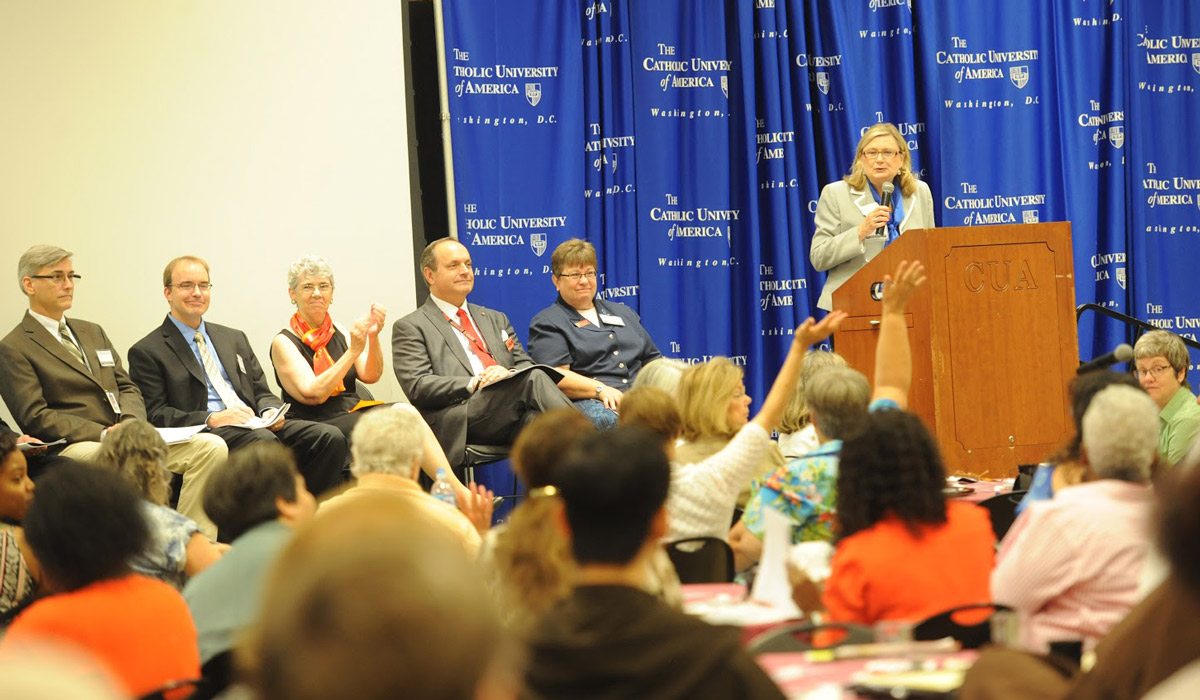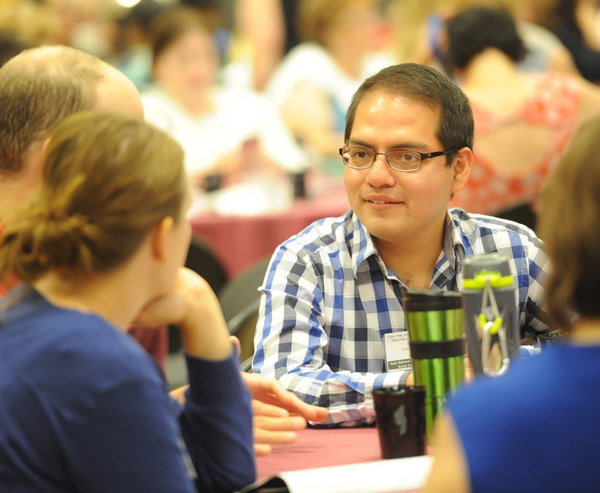

Though it is often shrouded in secrecy, domestic violence and abuse is more common than one might imagine. It affects approximately one in four women and one in seven men, according to recent numbers from the Centers for Disease Control. More than 350 social workers and social services providers gathered at The Catholic University of America earlier this month for a symposium exploring how the Catholic Church can best support these victims.
“Hope, Help, and Healing: A Catholic Response to Domestic Abuse” was hosted in part by the National Catholic School of Social Service (NCSSS) and its Catholics for Family Peace Education and Research Initiative. The symposium featured 54 expert presenters speaking on topics related to domestic violence, including Church teachings on the subject, applicable immigration laws, and healthy teen dating.
To begin the conference, Kathy Bonner, co-author of the National Council of Catholic Women’s "Women Healing the Wounds" document, spoke about the harm that domestic violence can inflict upon not just individuals, but entire communities. In addition to one’s immediate family, domestic violence can cause harm in the workplace, can require additional health care, and can put first responders in danger.
“Domestic abuse and violence is against God’s teaching and it’s an issue that affects families, women, men, children, all of their close family members, and their neighbors,” she said.
Domestic violence doesn’t always take place suddenly, according to Bonner. Often, she said, abusers will gradually isolate their victims over time and use gas-lighting tactics — a form of mental abuse in which a victim is manipulated into doubting their memory and perception — to damage their confidence and self-esteem.
Bonner also addressed ways in which friends and family can “re-victimize” those being abused by either normalizing abusive behavior or telling the person to “just leave” without considering how dangerous that could be. Often this happens because of “so many years of desensitization in our community.”

“Most people don’t have a clear view of what is normal in relationships,” she said.
During her presentation, Christauria Welland, a clinical psychologist from San Diego, gave statistics about intimate partner violence, which refers to “behavior by an intimate partner or ex-partner that causes physical, sexual, or psychological harm, including physical aggression, sexual coercion, psychological abuse, and controlling behaviors.”
While domestic abuse is often associated with heterosexual marriage, Welland said it can be found in relationships of all kinds, including homosexual relationships, dating relationships, and relationships in which partners are not sexually intimate. Both women and men can become victims.
Eileen Dombo, associate professor, assistant dean, and chair of the master’s program for NCSSS, spoke about the role of the first responder in cases of domestic violence. She advised responders to help victims come up with a safety plan that would include ways to stay safe while still living with the abuser, guidelines for leaving, and ideas for staying safe after leaving.
“Instead of talking about ‘when are you going to leave,’ talk about ‘how can you stay safe,” she suggested.
Dombo also spoke of how abuse often follows specific rhythms: periods of building tension, followed by actual abuse, and then a honeymoon period. Unfortunately, those patterns can be hard to identify for the victims themselves, who usually mentally dissociate from traumatic events to protect themselves. In addition, because honeymoon periods can be so long, victims may convince themselves that abuse was a onetime occurrence that will never be repeated.
“Not only is it difficult to grasp the cycle of violence, it is also hard for victims to come to terms with the fact that abuse is happening,” Dombo said.
The symposium was held with the support of partnering organizations — the United States Conference of Catholic Bishops, Catholic Charities USA, Catholic Charities Archdiocese of Washington, and Catholic Charities Diocese of Arlington. The event’s inaugural sponsor was the National Council of Catholic Women.
NCSSS's Consortium for Catholic Social Teaching was the fiscal sponsor of the symposium. According to NCSSS Dean Will Rainford, who led the collaborative effort, the conference was “a way to create educational opportunities of importance to the Roman Catholic Church in America.” The symposium on domestic violence followed one held last year that was focused on human trafficking.
Though the problem of domestic violence is a big one that can seem difficult to tackle, Art Bennett, chair of Catholic Charities for the Arlington diocese, noted the Church’s responsibility to do just that.
“The worst thing to say is that there are some problems that can’t be fixed,” he said. “Our mission is to bring hope and healing.”
While the secular world can offer much in the way of compassion and empathy toward victims, as well as outstanding research about prevention and support, Bennett said the Church has a secret weapon for helping victims.
“The great asset we can bring to this fight is the forgiveness and mercy of Jesus Christ,” he said.
For more information on the symposium, including online videos and resources, visit the Catholics for Family Peace website.
Find out about degree programs at the National Catholic School of Social Service.